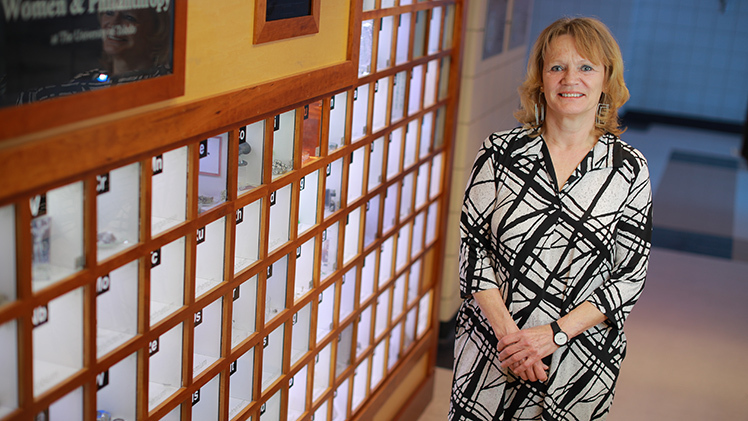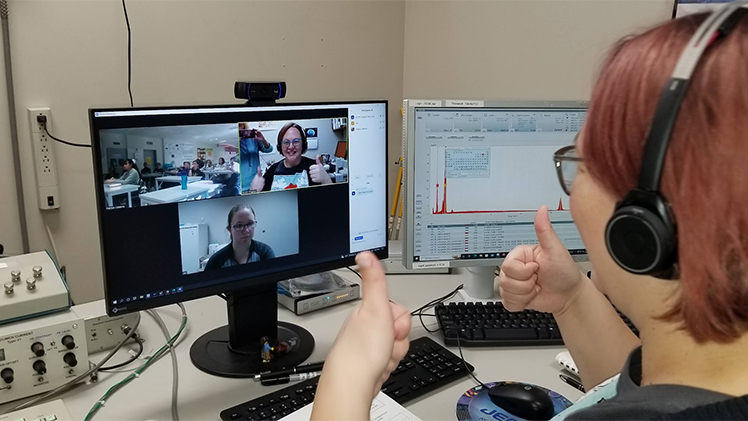Through a unique program at The University of Toledo, more than 7,000 elementary, middle and high school students in the U.S. and around the globe have used sophisticated scientific instruments to get a rare perspective into the world around them along with a taste of what academic research is really like.
Free to any school wishing to participate, the SCOPE program in the UToledo College of Natural Sciences and Mathematics launched locally 12 years ago in the Instrumentation Center and went international thanks to lessons in remote connections learned during the COVID-19 pandemic.

UToledo’s sophisticated science instruments are operated remotely by thousands of elementary, middle and high school students across the globe through the SCOPE program led by Dr. Kristin Kirschbaum, director of the UToledo Instrumentation Center.
“The SCOPE Program uses instruments that are controlled by a computer interface. Since we are already using computers to control the instruments in person, we are able to use desktop-sharing software to allow remote access to the schools we work with,” said Dr. Kristin Kirschbaum, director of the UToledo Instrumentation Center and creator of the SCOPE program, which is an acronym for Scientists Changing Our Pre-College Education. “The children see our computer screen. With guidance from UToledo scientists, they run the microscope as if they were on campus.”
The on-campus team member gives an introduction and loads a holder with samples. Using the remote-control option of Zoom, students as young as fourth graders can change the samples, zoom in and out, take pictures and measure the sizes of samples. One of the high-powered microscopes can magnify samples up to 1 million times.
UToledo offers different sessions depending on the equipment being used.
During the pandemic, a module on face masks was popular. Students using a scanning electron microscope looked at the sizes of holes in different styles of face masks and then compared those to known sizes of viruses, droplets and other particles to figure out which type of face covering is most effective.
Another session about how flowering plants reproduce allowed students to view up to 10 different types of pollen. Students learned about the different surface structures of pollen and determined if they are carried on the wind or carried by insects.
“We also have collaborated with classroom teachers to create unique sessions based on what they are studying in their classroom,” said Cassandra Zamora, outreach program coordinator.

Cassandra Zamora, the outreach program coordinator, gives a thumbs-up to students during a learning session.
For example, Northwood High School in Ohio asked about HeLa cells, the famous cancer cell line derived from the cells of Henrietta Lacks. Biology students in 10th grade were learning about the cells in science while also reading a book about Henrietta Lacks in their language arts classes.
“Dr. Rafael Garcia-Mata, a professor of biological sciences at UToledo, studies HeLa cells in his laboratory, and our SCOPE program was able to allow the students to use the confocal microscope to view the very same HeLa cell line they were learning about,” Zamora said.
The Instrumentation Center offers a scanning electron microscope, which enables the observation of objects at the micro- and nano-meter scales and is used to examine the morphology of samples. The SCOPE program also features a confocal light microscope, which delivers optical images with enhanced resolution, and a gas chromatography-mass spectrometer, which analyzes the chemical composition of aromas and flavors.
“The equipment is not readily available to many people, international or not,” Kirschbaum said. “By allowing aspiring scientists to access these specialized instruments, we are introducing them to concepts and techniques they may never have had the opportunity to access otherwise.”
SCOPE has worked with classrooms from 17 states in the U.S. as well as teachers and students in China, Czech Republic and Germany. The program will soon be offering sessions with classes in the Philippines.
“What a fantastic program,” said Toni Greene, a teacher in Hong Kong whose class participated in the SCOPE program. “My head of school walked in on the second session and was really blown away that our students had an opportunity to control a scanning electron microscope. The kids really loved it too. The information presented was great, and I personally learned so much.”